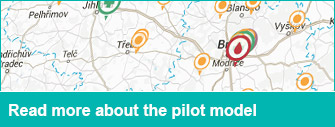



Introduction
Cancer care is a prime example of multidisciplinary medical service that requires integration and a certain degree of centralisation in order to ensure optimal use of resources available and to achieve optimal treatment outcomes. On the other hand, all patients with a certain type of cancer should be provided with the same treatment protocol without regard to the health care facility in which the disease was diagnosed.
The Work Package 6 of the EU Joint Action CanCon focuses on the concept of Comprehensive Cancer Care Network (CCCN). Pooling of resources and a larger patient base would enable a CCCN to make rational short-term and long-term plans capitalising on complementary expertise of individual professionals, while avoiding unnecessary and costly duplications. This would provide, for patients nearer their homes, a seamless pathway of care that will be at the same time sustainable.
A pilot model of such CCCN has been set up in the Czech Republic, namely in the Vysočina Region and South Moravian Region (South-West Moravia, SW Moravia). The pilot model covers all components of cancer care: from cancer prevention and organised screening programmes through standard diagnostic and treatment procedures to follow-up plans; specialised rare tumours-focused care as well as palliative are also included.



